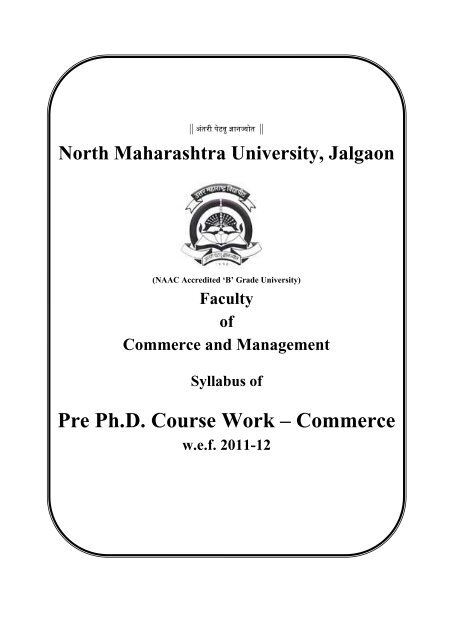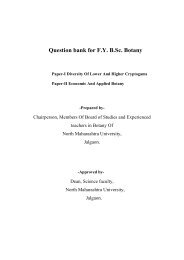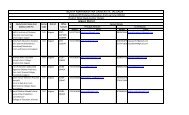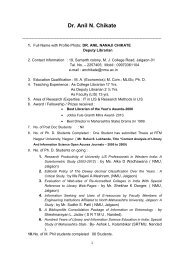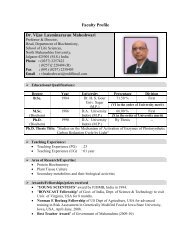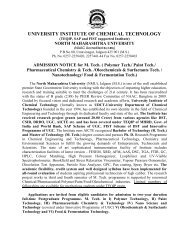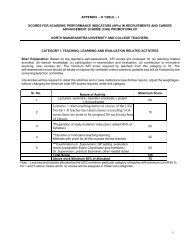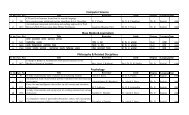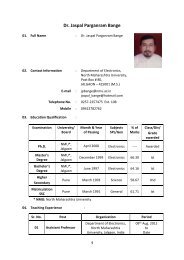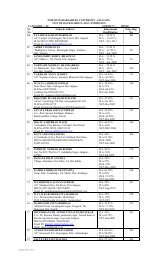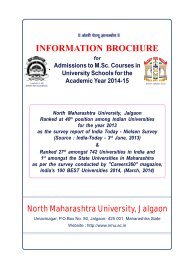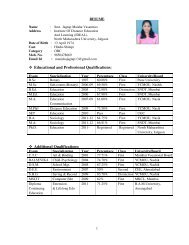Syllabus of - North Maharashtra University
Syllabus of - North Maharashtra University
Syllabus of - North Maharashtra University
Create successful ePaper yourself
Turn your PDF publications into a flip-book with our unique Google optimized e-Paper software.
|| †ÓŸÖ¸üß ¯Öêü¾Öæ –ÖÖÖ•µÖÖêŸÖ ||<br />
<strong>North</strong> <strong>Maharashtra</strong> <strong>University</strong>, Jalgaon<br />
(NAAC Accredited ‘B’ Grade <strong>University</strong>)<br />
Faculty<br />
<strong>of</strong><br />
Commerce and Management<br />
<strong>Syllabus</strong> <strong>of</strong><br />
Pre Ph.D. Course Work – Commerce<br />
w.e.f. 2011-12
<strong>North</strong> <strong>Maharashtra</strong> <strong>University</strong>, Jalgaon<br />
(NAAC Accredited ‘B’ Grade <strong>University</strong>)<br />
Faculty <strong>of</strong> Commerce and Management<br />
Pre Ph.D. Course Work – Commerce<br />
w.e.f. 2011-12<br />
PAPER-II: COMMERCE<br />
------------------------------------------------------------------------------------<br />
ORGANISATION AND MANAGEMENT<br />
Nature <strong>of</strong> Management<br />
Concept <strong>of</strong> Management, Management and Administration: A Terminological<br />
Conflict Importance <strong>of</strong> Management, Nature <strong>of</strong> Management, Management: Science<br />
or Art Management as Pr<strong>of</strong>ession, Pr<strong>of</strong>essionalisation <strong>of</strong> Management in India,<br />
Universality <strong>of</strong> Management, Applying Management Theory in Practice, Role <strong>of</strong><br />
Management Principles Effective Management<br />
Management Functions and Skills<br />
Management Functions, Nature <strong>of</strong> Management Functions, Management Role,<br />
Functions at Various Levels <strong>of</strong> Management, Top Management, Functions <strong>of</strong> Board<br />
<strong>of</strong> Directors, Functions <strong>of</strong> Chief Executive, Middle Management, Supervisory<br />
Management, Functional Areas <strong>of</strong> Management, Management Skills, Top<br />
Management Skills<br />
Planning<br />
Concept <strong>of</strong> Planning, Nature <strong>of</strong> Planning, Importance <strong>of</strong> Planning, Steps in Planning,<br />
Types <strong>of</strong> Planning, Corporate and Functional Planning, Strategic and Operational<br />
Planning, Long- term and Short-term Planning, Proactive and Reactive<br />
Planning, Formal and Informal, Planning, Types <strong>of</strong> Plans, Barriers to Effective<br />
Planning, Making Planning Effective<br />
Decision Making<br />
Concept <strong>of</strong> Decision and Decision Making, Types <strong>of</strong> Decisions, Decision-making<br />
Process Effective Decisions, Guidelines for Making Effective Decision, Individual vs.<br />
Group, Decision Making, Rationality in Decision Making, Creativity and Decision<br />
Making Role <strong>of</strong> Creativity in Decision Making, Decision-making Conditions<br />
Organising<br />
Concept <strong>of</strong> Organisation and Organising, Organisation Theory, Classical Organisation<br />
Theory, Neoclassical Organisation Theory, Modern Organisation Theory: Systems<br />
Approach, Modern Organisation Theory: Contingency Approach, Factors Affecting<br />
Organisation Structure, Size <strong>of</strong> Organisation<br />
Controlling<br />
Concept <strong>of</strong> Controlling, Controlling and Other Functions, Steps in Controlling, Types<br />
<strong>of</strong> Controlling, Control Areas, Controlling and Management by Exception, Benefits <strong>of</strong><br />
Management by Exception, Design <strong>of</strong> Effective Control System, Essentials <strong>of</strong><br />
Effective Control System, Behavioural Implications <strong>of</strong> Control, Causes <strong>of</strong> Resistance<br />
to Control<br />
Human Resource Management<br />
Meaning, Objectives, and Human Resource Planning<br />
Human Resource Development<br />
Concept and HRD tools, Training objectives and Methods.
ACCOUNTANCY<br />
Advanced Accounting<br />
Elementary study <strong>of</strong> Accounting standards -<br />
a. Introduction, Objectives, Advantages, and Applicability <strong>of</strong> Accounting Standards<br />
b. Elementary Study <strong>of</strong><br />
i. AS-1- Disclosure <strong>of</strong> Accounting Policies<br />
ii. AS-2 – Valuation <strong>of</strong> Inventories<br />
iii. AS-6 - Depreciation Accounting<br />
iv. AS-10 – Accounting for Fixed Assets<br />
v. A.S.4 Contingencies & events occurring after the Balance Sheet dates<br />
Accounting for Amalgamation -<br />
Amalgamation <strong>of</strong> companies - Concepts <strong>of</strong> Amalgamation – Types <strong>of</strong> Amalgamation -<br />
Amalgamation in the nature <strong>of</strong> Merger and Amalgamation in the nature <strong>of</strong> Purchase -<br />
Purchase consideration - AS 14 on ACCOUNTING FOR AMALGAMATION.<br />
Developments in Accounting<br />
Elementary study <strong>of</strong> - Human Resources Accounting, Inflation Accounting, Value Added<br />
Statement, Corporate social reporting, Interim reporting<br />
Cost and Management Accounting<br />
Cost Accounting<br />
Costing, Cost Accounting, Cost Accountancy- Objectives, Scope, Advantages and<br />
Limitations <strong>of</strong> Cost Accounting. Qualities <strong>of</strong> a good cost accounting system, Essential<br />
factors for installing a cost accounting system. Relationship between Cost Accounting,<br />
Financial Accounting, and Management Accounting<br />
Marginal Costing & Break-Even-Analysis<br />
Marginal Costing – Concepts <strong>of</strong> Marginal Cost and Marginal Costing, Advantages and<br />
Limitations <strong>of</strong> Marginal Costing, Classification <strong>of</strong> costs, Fixed, Variable, Semi-variable-<br />
Break-up <strong>of</strong> Semi-Variable Expenses, Role <strong>of</strong> Contribution, Basic Equation <strong>of</strong> Marginal<br />
Costing, Marginal Costing Vs Absorption costing, Break–Even Analysis- Meaning <strong>of</strong><br />
Break-even point, Break-even Chart, Pr<strong>of</strong>it-Volume Ratio, Margin <strong>of</strong> Safety, Key-Factor,<br />
Cost-Volume Pr<strong>of</strong>it analysis, Point <strong>of</strong> Indifference, Computation and application <strong>of</strong> Break-<br />
Even Analysis. Major areas <strong>of</strong> application [Theory only]<br />
Budget and Budgetary Control :<br />
Concept <strong>of</strong> Budget, Budgeting & Budgetary Control, Budget Manual, Objectives,<br />
Advantages, Limitations <strong>of</strong> Budgetary Control.<br />
Classification <strong>of</strong> Budgets - Long term, Short term budget, Flexible budget, Fixed budget,<br />
Master Budget, Functional Budgets: Sales Budget, Production Budget, Purchase Budget,<br />
Capital Expenditure Budget, Cash Budget, Zero-Base Budgeting (ZBB), Nature, procedure,<br />
Advantages and limitations <strong>of</strong> ZBB<br />
Financial Management<br />
Financial statements<br />
Meaning, Nature, Objectives, and Importance <strong>of</strong> Financial Statements –Limitation <strong>of</strong><br />
Financial statements – Requisites, Attributes or Essential Requirements <strong>of</strong> Financial<br />
Statements – Recent trends in Presenting Financial statements<br />
Analysis and Interpretation <strong>of</strong> Financial Statements<br />
Analysis and Interpretation - Meaning – Types <strong>of</strong> Analysis and Interpretations- Internal<br />
Analysis – External Analysis- Horizontal Analysis – Vertical analysis
Tools <strong>of</strong> Analysis and Interpretation – Meaning, Nature, Objectives, Significance and<br />
Limitations <strong>of</strong>: Comparative Financial Statements, Common Size Statements, Trend<br />
Analysis, Ratio Analysis, Fund Flow Analysis and Cash Flow Analysis<br />
Calculations <strong>of</strong> Ratios<br />
Liquidity Ratios - Current ratio- Quick ratio- Absolute Liquid Ratio<br />
Pr<strong>of</strong>itability Ratios - Gross Pr<strong>of</strong>it Ratio- Net Pr<strong>of</strong>it Ratio- Operating ratio- Operating Pr<strong>of</strong>it<br />
ratio- Return on Investment- Return on capital Employed Ratio- Earning per share Ratio-<br />
Dividend Yield Ratio- Price earnings Ratio- Net pr<strong>of</strong>it to Net Worth ratio<br />
Efficiency /Turnover Ratios - Stock turnover ratio – Debtors turnover ratio- Debt<br />
collection period ratio- Creditor turnover ratio- Average payment period- Working capital<br />
turnover ratio-Fixed assets turnover ratio- Capital turnover ratio<br />
AUDITING<br />
Auditing Concepts - Nature and limitations <strong>of</strong> Auditing, Basic Principles governing an<br />
audit, Objectives & scope <strong>of</strong> the audit <strong>of</strong> financial statements, Difference between Auditing<br />
and Investigation<br />
Types <strong>of</strong> Audit - Features, principles, advantages & limitations <strong>of</strong> - Internal audit,<br />
Statutory audit, Continuous audit, Annual audit, Interim audit, Balance sheet audit, Tax<br />
audit, Cost audit, Efficiency audit.<br />
Company Audit – Qualifications and Disqualifications <strong>of</strong> Auditors, Appointment <strong>of</strong><br />
auditors, Removal <strong>of</strong> auditors, Powers and duties <strong>of</strong> auditors, Qualified Audit Report and<br />
Clean Audit Report.<br />
MARKETING<br />
Meaning and Definition <strong>of</strong> Marketing - Traditional v/s Modern Concept – Scope –<br />
Importance – Approaches to Study <strong>of</strong> Marketing – Commodity – Institutional Approach,<br />
Functional approach, Decision making approach legal and system approach – Marketing v/s<br />
Societal Marketing – Marketing Process, functions <strong>of</strong> Marketing.<br />
Marketing Mix – P 5<br />
Meaning and Composition – Formulation <strong>of</strong> new Product Strategy – Product planning and<br />
process – Product life cycle – Product positioning – New product planning – Product<br />
diversification strategy.<br />
Service Marketing –<br />
Reasons for growth in Service Sectors – Role <strong>of</strong> Services in an economy – Services in<br />
Indian Scenario – Types <strong>of</strong> Services – Characteristic <strong>of</strong> Services – Difference between<br />
goods services – Needs for services marketing – Obstacles in service marketing.<br />
International Marketing Practices and Problems –<br />
Definition and Meaning – Domestic market and international market – special<br />
consideration in in international marketing – difficulties in international marketing – Tariff<br />
and Non Tariff – Barriers to international marketing – Developing a marketing strategy –<br />
selecting a market – Taking entry into market – Direct and indirect exporting – Licensing.<br />
BUSINESS ECONOMICS AND BANKING<br />
Business Economics:<br />
i) Introduction<br />
ii) Demand Analysis and Elasticity <strong>of</strong> Demand<br />
iii) Utility Analysis.<br />
Market Structure & Price Determination:<br />
i) Cost, Revenue and Price Determination in different Market situation.<br />
ii) Production Function –Law <strong>of</strong> variable proportion and law <strong>of</strong> returns to scale.<br />
Macro Economics:
i) Classical and Keynesian Approach in Determination <strong>of</strong> output & employment<br />
ii) Macro Economic Problems – Inflation, Unemployment & Business cycle.<br />
iii) Monetary and Fiscal Policy.<br />
Banking:<br />
i) Meaning & Functions <strong>of</strong> Commercial Bank.<br />
ii) Accounts <strong>of</strong> Customers.<br />
iii) Negotiable Instruments.<br />
iv) Reserve Bank <strong>of</strong> India.<br />
REFERENCE BOOKS<br />
Organisation and Management<br />
1. Principles and Practice <strong>of</strong> Management - L.M Prasad<br />
2. An Introduction to Business Organisation and Management - Singh and Chhabra<br />
3. Business Management in 21st Century - R. K Desai<br />
4. Management Concepts and Strategies - J.S Chandan<br />
5. Principles and Practice <strong>of</strong> Managements- A New Horizon - Jaya Bhattacharya<br />
6. Taxmann's Principles <strong>of</strong> Management - Dr. Neeru Vasisth<br />
7. Vyavasaay Vyavasthapan - Dr. Prabhaker deshmukh<br />
8. Personnel and Human Resource Management – P.Subba Rao, Himalaya Publishing<br />
House.<br />
Accountancy<br />
1. Advanced Accountancy – Vol. I , R. L. Gupta & M. Radhaswamy, Sultan Chand &<br />
Sons<br />
2. Advanced Accounts, M.C. Shukla, T.S. Grewal & S.C. Gupta, S. Chand & Co Ltd.<br />
3. Advanced Accounts - Jain and Narang - Kalyani Publishers, Ludhiana<br />
4. Accounting Theory, R. K. Lele and Jawaharlal, Himalaya Publishers<br />
5. Accounting Text & Cases, Robert Anthony, D.F.Hawkins & K.A.Merchant- Tata<br />
McGraw Hill<br />
6. Corporate Accounting, Dr. S. N. Maheshwari, Viakas Publishing House Pvt. Ltd. New<br />
Delhi<br />
7. Advanced Accounting, Dr. Ashok Sehgal & Dr. Deepak Sehgal: Taxmann, New Delhi.<br />
8. Fundamentals <strong>of</strong> Cost Accounting - S N Maheshwari – Sultan Chand & Sons, New<br />
Delhi.<br />
9. Cost Accounting - Jawaharlal – Tata McGraw Hill Publishing company Limited New<br />
Delhi.<br />
10. Advanced Cost and Management Accounting - V. K. Saxena and C. D. Vashist - Sultan<br />
Chand & Sons, New Delhi<br />
11. Cost & Management Accounting - Ravi M Kishore - Taxmann Allied Services Pvt Ltd<br />
12. Financial Management – P. V. Kulkarni, B. G. Satyaprasad - Himalaya Publishing<br />
House<br />
13. Financial Management - Ravi M Kishor –Taxmann<br />
14. Financial Management – M. Y. Khan,, P. K. Jain- Tata McGraw Hill<br />
15. B. N. Todon – Practical Auditing.<br />
16. Dr Kamal Gupta – Fundamentals <strong>of</strong> Auditing – TMH – New Delhi.<br />
17. Saxena & Saravaravel – Practical Auditing – Himalaya Publishing House, Mumbai.<br />
18. Saxena & Reddy – Essentials <strong>of</strong> Auditing - Himalaya Publishing House, Mumbai.<br />
19. L.K.Shukla – Auditing – Principles & Practice – Taxmann law’s New Delhi.<br />
20. Auditing by Vinod Kumar Agrawal & Abhishek Porwal – A.S.Foundation, Pune.
Marketing<br />
1. Marketing Management – Philip Kotler.<br />
2. Marketing Management – R. Jay Praash Reddy.<br />
3. Marketing Management – Dhruba Datta Chawdhary.<br />
4. Marketing Management – S. A. Sherlkar.<br />
5. Service Marketing – Vasanti Venugopal, Raghu V. N.<br />
6. International Marketing - Dr. Gupta Nand.<br />
Business Economics and Banking<br />
1. Business Economics and Business Environment, by S.K. Misra and V.K.Puri.<br />
Pub- Himalaya Publishing House, Mumbai.<br />
2. Business Economics, by V.G.Mankar, Pub- Macmillan Publishers India Ltd.<br />
3. Principles <strong>of</strong> Microeconomics, by H.L.Ahuja.<br />
4. Economics Environment <strong>of</strong> Business ( Microeconomics Analysis ),by H.L.Ahuja<br />
5. Money, Banking, International Trade and Public Finance. By –D.M.Mithani, Pub-<br />
Himalaya Publishing House, Mumbai.<br />
6. Banking Theory and Practice, by K.C.Shekhar and Lekshmy Shekhar, Pub- Vikas<br />
Publishing House Pvt. Ltd., New Delhi.<br />
7. Modern Economic Theory, by K.K. Dewett, Pub- S.Chand Pub, New Delhi.<br />
8. Banking Theory, Law and Practice, Prf. E.Gardon and Dr.K.Natrajan, Himalaya<br />
Publishing House, Mumbai.<br />
9. Law and Practice <strong>of</strong> Banking (16 th Ed.) by Pr<strong>of</strong>. S.R. Davar. , Pub- Progressive<br />
Corporation Pvt. Ltd., Bombay.<br />
10. Banking Theory, Law and Practice by K.P.M. Sundharam and P.N. Varshney, Pub-<br />
Sultan Chand & Sons, New Delhi.
|| †ÓŸÖ¸üß ¯Öêü¾Öæ –ÖÖÖ•µÖÖêŸÖ ||<br />
<strong>North</strong> <strong>Maharashtra</strong> <strong>University</strong>, Jalgaon<br />
(NAAC Accredited ‘B’ Grade <strong>University</strong>)<br />
Faculty<br />
<strong>of</strong><br />
Commerce and Management<br />
<strong>Syllabus</strong> <strong>of</strong><br />
Pre Ph.D. Course Work – Management<br />
w.e.f. 2011-12
<strong>North</strong> <strong>Maharashtra</strong> <strong>University</strong>, Jalgaon<br />
(NAAC Accredited ‘B’ Grade <strong>University</strong>)<br />
Faculty <strong>of</strong> Commerce and Management<br />
Pre Ph.D. Course Work – Management<br />
w.e.f. 2011-12<br />
PAPER-II : MANAGEMENT<br />
------------------------------------------------------------------------------------------------<br />
GENERAL MANAGEMENT<br />
Nature & Development <strong>of</strong> Management<br />
Management: Concept, Nature, Importance, Art and Science & as a Pr<strong>of</strong>ession, Management<br />
Vs Administration, Decision Theory Approach, Contingency Approach, Human behavior<br />
Approach, Challenges <strong>of</strong> management due to globalization, The organizational Chart., Levels <strong>of</strong><br />
Management & their respective Functions, Job design, Managerial Functions in MNC’s<br />
Departmentalization, Methods <strong>of</strong> Vertical Co-ordination, Need and Significance <strong>of</strong><br />
Management, Management V/S Administration, levels <strong>of</strong> Management<br />
Process <strong>of</strong> Management<br />
Planning: Nature, Scope, Objective and Significances <strong>of</strong> Planning, Key factors to planning,<br />
Types <strong>of</strong> Plans, Process <strong>of</strong> Planning, Effective planning-Principles, Barriers & How to<br />
overcome barriers.<br />
Organizing: Concept, Designing Organization Structure, Forms <strong>of</strong> Organizational Structure,<br />
Departmentation- need, importance & bases <strong>of</strong> Departmentation, Span <strong>of</strong> Control -<br />
Determination <strong>of</strong> factors affecting Span <strong>of</strong> Control, Delegation <strong>of</strong> Authority, Authority &<br />
Responsibility, Line & Staff, and Formal & Informal Organization.<br />
Staffing: fundamentals <strong>of</strong> staffing Concept, Manpower Planning. system approach to staffing<br />
Directing: Concept, Direction and Supervision, Importance <strong>of</strong> Directing, Principles <strong>of</strong><br />
Directing.<br />
Coordination – Need & Importance, Coordination & Cooperation, Techniques <strong>of</strong> Effective<br />
coordination.<br />
Controlling : Concept, Types <strong>of</strong> control, Method : Pre-control - Concurrent control - Post<br />
control, an Integrated Control System, Concept <strong>of</strong> Quality, Factors affecting Quality,<br />
Developing a Quality, Control system - Pre-control <strong>of</strong> inputs.<br />
Decision Making<br />
Meaning Importance and types <strong>of</strong> decision, Decision making process, Effective decisions,<br />
creativity and decision making, Quality and quantitative techniques used for decision making,<br />
Planning Premises and Forecasting, Total quality management, Kaizen concept, Just in time<br />
inventory<br />
Quantitative Techniques in Operations Management<br />
Introduction to operations Research- Decision Making, Role <strong>of</strong> Technology In OR-<br />
Transportation Model- Assignment Model-CPM&PERT, Inventory Management, Inventory<br />
Models(EOQ)<br />
Corporate Social Responsibility and Business Ethics<br />
Concept & Definition <strong>of</strong> Corporate Social Responsibility, Scope <strong>of</strong> Corporate Social<br />
Responsibility, Corporate Social Responsibility and the Law, Corporate Social Responsiveness,<br />
Definition <strong>of</strong> Ethics, Nature & objective Ethics, Ethics &Related Terms: Ethics & Morality,<br />
Ethics & Religion, Ethics & Law, Distinction Between Values & Ethics, Meaning & Scope <strong>of</strong><br />
Business Ethics<br />
Management Information Systems:<br />
Concepts, Classification & Value <strong>of</strong> Information, Information System: Open & Closed,<br />
Management Information System, Definition, Concepts & Meaning, Components & Activities<br />
Types – Operation support system & Management support systems , Control systems –
Feedback & Feed forward systems,. MIS planning process – Steps in planning, MIS design &<br />
Development Process – Phases, Components <strong>of</strong> MIS, MIS vis-à-vis Computer, Academics &<br />
Users, MIS vis-à-vis Information Concepts, System Concepts, Process <strong>of</strong> Management<br />
Information System, System Analysis & Design, Introduction & Need for System analysis,<br />
System analysis <strong>of</strong> a new requirement, Structured systems analysis & Design (SSAD) ,<br />
Development <strong>of</strong> MIS, Introduction & Contents <strong>of</strong> MIS Long range plans, Determining the<br />
information Requirement , Management <strong>of</strong> Quality in the MIS, Factors contributing in the<br />
Success & Failure <strong>of</strong> MIS.<br />
MARKETING MANAGEMENT<br />
Marketing Management<br />
Introduction to Marketing, Marketing Management-Definition, nature and scope Marketing,<br />
Process Forms <strong>of</strong> Marketing, Organisation Market Segmentation and Target Marketing,<br />
Consumerism<br />
Marketing Mix<br />
7 P’s <strong>of</strong> Marketing mix, Product Life Cycle, Sales Management, Brand and Brand Management.<br />
Marketing Research and Consumer Behaviour<br />
Marketing Research- Meaning, Types and Process, Marketing Information System.<br />
a. Consumer behaviour: Determinants <strong>of</strong> consumer behaviour<br />
b. Consumer decision making process/ Buying Process:<br />
i) For Normal products: Need recognition, Information search, Evaluation <strong>of</strong><br />
alternatives, Purchasing decision & post-purchase behaviour.<br />
(ii) For New products: Awareness, Interest, Evaluation, and Trial & Adoption<br />
c) Organizational buyer decision process: Problem recognition, Product specification, Product &<br />
Vendor search, Product & Vendor evaluation, Product & Vendor selection & performance<br />
evaluation<br />
New Trends in Marketing<br />
International Marketing, E-Marketing, Green Marketing, Social Marketing, Holistic Marketing,<br />
Emotional Marketing, Customer Relationship Management<br />
FINANCIAL MANAGEMENT<br />
Introduction to Financial Management<br />
Approaches to Financial Management: Traditional View - Modern View, Different Financial<br />
Decision<br />
Financial Management’s Importance in Business: Significance <strong>of</strong> Financial Controller-Finance<br />
Manager as a Facilitator- Organization Chart <strong>of</strong> Finance Function-Reason for Centralizing<br />
Finance Function<br />
Financial Objectives <strong>of</strong> Business Firm: Pr<strong>of</strong>it Maximization, Wealth Maximization, Value<br />
Maximization, Other Maximization Objectives, Agency theory <strong>of</strong> Firm<br />
Components <strong>of</strong> Financial system: Function <strong>of</strong> Financial system, financial system design, Nature<br />
and role <strong>of</strong> financial Institution {Intermediaries} and financial market<br />
Raising Finance<br />
a) Short term Financing<br />
i) Introduction & Characteristics<br />
ii) Sources <strong>of</strong> Short term Finance<br />
b) Long Term Financing<br />
i) Need for long term financing<br />
ii) Sources <strong>of</strong> Long Term Finance<br />
iii) Risk analysis in Capital Budgeting & Sensitivity analysis<br />
c) Primary & Secondary Markets<br />
i) Meaning, Importance & Role<br />
ii) Market intermediaries: brokers, dealers, investment bankers<br />
iii) Bid, Ask or Offer, bid‐ ask spread, Bull and bear, blue chips, day trading, stop loss,<br />
iv) BSE/ NSE Indices
Investment Decisions<br />
a) Short term Investment Decisions<br />
b) Long term Investment Decisions<br />
1) Time value <strong>of</strong> Money<br />
(i) An overview & Study <strong>of</strong> Time lines<br />
(ii) Theory <strong>of</strong> interest or computation <strong>of</strong> Interest<br />
(iii) Amortization <strong>of</strong> a loan<br />
2) Capital Expenditure Planning & control<br />
(i) Definition, Importance<br />
c) Venture Capital Finance<br />
i) Introduction, Meaning Features & Types<br />
ii) Stages <strong>of</strong> Venture Capital Investment<br />
d) Mutual Funds: Concept & Types<br />
e) Decision making techniques<br />
i) Lease or Buy<br />
ii) Make or Buy<br />
iii) Manufacture or Vendor Development<br />
iv) Do or Outsource<br />
f) Owners Self Outlet or Franchisee appointment<br />
Emerging trends Finance<br />
Concepts <strong>of</strong><br />
a) Corporate Combinations<br />
b) Corporate Financial Distress<br />
c) Derivatives & Options<br />
d) Hybrid Financing: preferred stock, leasing, warrants & convertibles<br />
e) Reverse Mortgage<br />
f) Credit rating<br />
g) Portfolio Management<br />
h) International Financial Management<br />
HUMAN RESOURCE MANAGEMENT<br />
Introduction to Human Resource Management<br />
a) Concept, Characteristic & Significance <strong>of</strong> Human Resource<br />
b) Definitions, Nature, Scope & Objectives <strong>of</strong> HRM<br />
c) Functions <strong>of</strong> HRM.<br />
d) HRM Vs. Personnel Management<br />
e) HRM Vs. HRD<br />
f) Challenges before HRM<br />
g) Employer‐Employee Relationship: concepts, Objectives, Parties, Measures for Improvement<br />
Human Resource Management Process<br />
a) Human Resource Planning<br />
i) Concept & Need <strong>of</strong> HRP<br />
ii) Process <strong>of</strong> Human Resource Planning<br />
iii) Methods <strong>of</strong> Demand Forecasting<br />
iv) Prerequisites <strong>of</strong> HRP<br />
b) Process <strong>of</strong> Procurement<br />
i) Recruitment<br />
(1) Concept, Purpose & Factors Affecting Recruitment<br />
(2) Sources <strong>of</strong> Recruitment<br />
(3) Process <strong>of</strong> Recruitment<br />
ii) Selection<br />
(1) Concept Selection process<br />
(2) Barriers <strong>of</strong> selection<br />
iii) Placement: Concept & Problems
iv) Induction:<br />
(1) Concept, Objective & Steps in Induction<br />
(2) Topics <strong>of</strong> Induction Programme<br />
(3) Problems in Induction<br />
Human Resource Development and Industrial Relations<br />
a) Performance appraisal<br />
i) Definitions, Objective & Process <strong>of</strong> Performance Appraisal<br />
ii) Methods <strong>of</strong> Performance Appraisal<br />
(1) Traditional Methods: Ranking, Paired Comparison, Grading, Critical<br />
Incident, Force Choice, Checklist, Graphic Rating, Essay Evaluation,<br />
Confidential Reports<br />
(2) Modern Methods: MBO, BARS, Assessment Centres, 360 Degree<br />
Appraisal System<br />
iii) Problems with Performance Appraisal<br />
b) Employee Training<br />
i) Meaning, Need and Objective <strong>of</strong> Training<br />
(1) Methods <strong>of</strong> Training: On the Job & Off the Job<br />
ii) Sensitivity Training<br />
iii) Evaluation <strong>of</strong> Training<br />
c) Executive Development<br />
i) Meaning & Methods <strong>of</strong> Executive Development<br />
d) Industrial Relations:<br />
i) Labour welfare & Social Security<br />
ii) Workers Participation in Management<br />
iii)Empowerment<br />
iv) Industrial hygiene<br />
Recent Trends in HRM<br />
Concepts <strong>of</strong> ‐<br />
a) Human Resource Audit<br />
b) Human Resource Information System<br />
c) Human Resource Accounting<br />
d) Employer branding<br />
e) Moonlighting by employees<br />
f) Dual career group<br />
g) Competency Mapping<br />
h) Downsizing & Rightsizing<br />
i) HR Matrix<br />
j) HR score card<br />
k) Talent Management<br />
l) Flexi‐time & Flexi‐work<br />
m) e‐HRM : e‐recruitment, e‐training & e‐learning.<br />
Reference Books<br />
GENERAL MANAGEMENT<br />
1. Principles <strong>of</strong> management By L.M.Prasad<br />
2. Principles <strong>of</strong> management by sherlekar and sherlekar<br />
3. Management process and prespective by T.N. Chhabra and R.K.Suri<br />
4. Ethical Management – Satish Modh - Macmillan<br />
5. Business Ethics - Agagalgatti – Nirali Prakashan<br />
6. Business Ethics – A.C.Fernando - Pearso<br />
7. Management & Organization – By Lious A. Allen, Tata McGraw Hill Book Company, Delhi<br />
8. Organization & Management – By C. B. Gupta, Sultan Chand & Sons, Delhi
9. Business Organization & Management – By R.N. Gupta, Sultan Chand & Sons, Delhi<br />
10. Corporate Governance: Principal Policies & Practices by Fernando, Pearson Education<br />
11. Corporate Ethics: The Business Code <strong>of</strong> Conduct for Ethical Employees by Steven R. Barth,<br />
Aspatore Books, 2003<br />
12. Production & Operations Management – Chunawala & Patel – Himalaya Publishing House<br />
13. Management Information System by Jawadekar – Tata McGraw Hill<br />
MARKETING MANAGEMENT<br />
1. Principle <strong>of</strong> Marketing by Kotler & Armstrong – Pearson, LPE 9th edition<br />
2. Marketing Management – Arunkumar N. Meenakshi – Vikas Publishing<br />
3. Marketing Management – Text & Cases by S H H Kazami – Excel Books<br />
4. Marketing Management – Stanton – McGraw Hill<br />
5. Marketing Management by Kotler, Keller & Koshti ‐ Tata McGraw Hill<br />
6. Marketing Management – Text & Cases by Tapan Panda – Excel Books<br />
7. Marketing Management by S.A Sherlekar – Himalaya Publishing House<br />
8. Marketing Management (Text & Cases in Indian Context) by Karunakaran– Himalaya<br />
Publishing House<br />
9. Marketing: Marketing in 21st Century – Berman – Biztantra (Willy India Pvt. Ltd.)<br />
10. Basics <strong>of</strong> Marketing Management – R.B. Rudani ‐ S. Chand & Company Ltd.<br />
FINANCIAL MANAGEMENT<br />
1. Financial Management by Ravi M. Kishore – Taxman Publication<br />
2. Financial Management tools & Techniques by Dr Pradip Kumar Sinha – Excel books<br />
3. Financial Management: Principles & Practice by G Sudarsana Reddy‐ Himalaya<br />
Publishing<br />
4. Fundamentals <strong>of</strong> Financial Management by Vyuptakesh Sharan – Pearson Education 2nd<br />
Edition<br />
5. Financial Management by I M Pandey – Vikas Publishing House<br />
6. Financial Management – P.V. Kulkarni, Satyaprasad ‐ Himalaya Publishing House<br />
7. Financial Management – Principles & Practice by Sudhindra Bhat– Excel Books<br />
8. Financial Management: Management & Policy By R.M. Srivastava ‐ Himalaya Publishing<br />
House<br />
9. Fundamentals <strong>of</strong> Financial Management by Brigham & Houton ‐ Cengage Learning<br />
10. Financial Management by Khan & Jain- Tata McGraw Hill<br />
HUMAN RESOURCE MANAGEMENT<br />
1. Human Resource Management, Text & Cases By Dr. V.S.P Rao ‐ Excel Books<br />
2. Essentials <strong>of</strong> Human Resource Management By P. Subba Rao – Himalaya Publishing<br />
House<br />
3. Human Resource Management By S.S.Khanka – S Chand & Sons<br />
4. Human Resource Management By Dr K. Ashwathappa – Tata McGraw Hill<br />
5. Comprehensive Human Resource Management By P.L.Rao ‐ Excel Books<br />
6. Human Resource Management By Snell, Bohalender Cengage Learning<br />
7. Human Resource Management by A M Sarma – Himalaya Publishing<br />
8. Managing Human Resources By Fisher‐ Cengage Learning<br />
9. Human Resource Management By Dr. C.B. Gupta – Sultand Chand & Sons<br />
10. Human Resource Management By Dipakkumar Bhattacharya: Excel Books<br />
11. Human Resource Management By Garvy Dessler.‐ Pearson/ Prantice Hall<br />
12. Human Resource Management, Principles & Practice By P. C. Acquinas ‐ Vikas<br />
Publishing.<br />
13. Personnel Management: C. B. Mamoria., Himalaya Publishing


